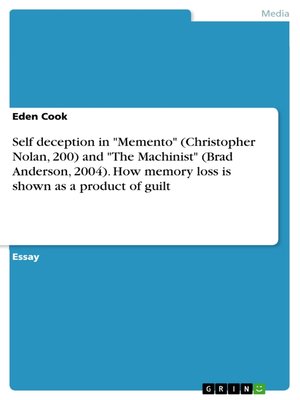Self deception in "Memento" (Christopher Nolan, 200) and "The Machinist" (Brad Anderson, 2004). How memory loss is shown as a product of guilt
ebook
By Eden Cook

Sign up to save your library
With an OverDrive account, you can save your favorite libraries for at-a-glance information about availability. Find out more about OverDrive accounts.
Find this title in Libby, the library reading app by OverDrive.



Search for a digital library with this title
Title found at these libraries:
| Library Name | Distance |
|---|---|
| Loading... |
Essay from the year 2017 in the subject Film Science, grade: 72, University of Greenwich, course: Film Studies, language: English, abstract: Throughout this essay I explore the ways in which the memory loss of Trevor Reznik and Leonard Shelby can be seen as a symptom of guilt. Whilst it may be drawn that Trevor's mental health is impacted by his insomnia, and Leonard's condition is explained by the accident, the complex narratives allow various readings, through which it can be speculated that the tormented mental states of both men results in a process of self deception, of which memory loss is a key element. Throughout the films there are various "clues" in the form of flashbacks, formative techniques, and the doubling of personality which suggests their guilty conscience plays a prominent role in their amnesia. Whilst the protagonists' lives are controlled by their inability to remember, their memory loss can be seen as a coping mechanism to shield traumatic events of their personal history from their current selves. In all, I discuss how the abnormal mental states of the protagonists can be seen as a result of psychological trauma and a guilty conscience, through which their subsequent memory loss is used in a process of deception.







